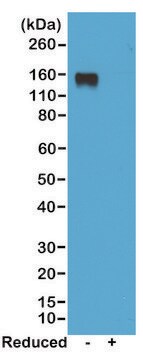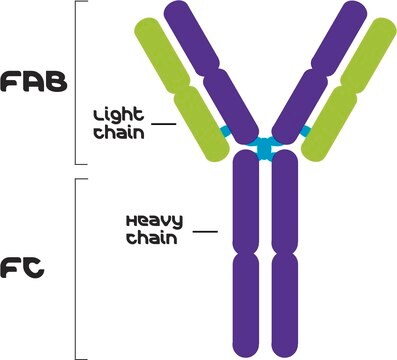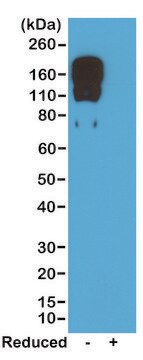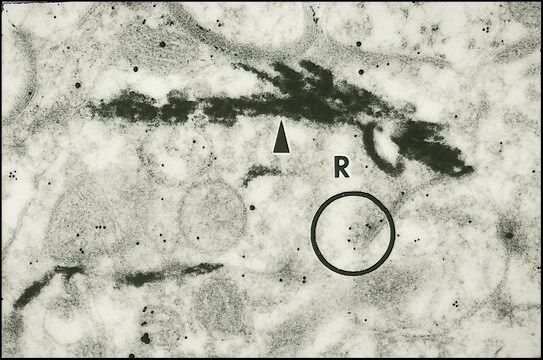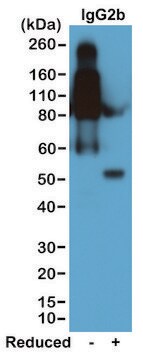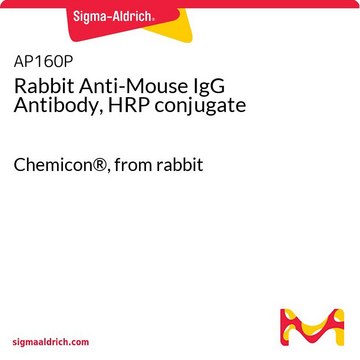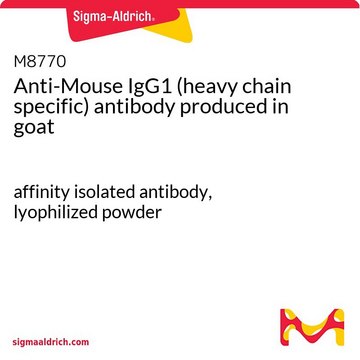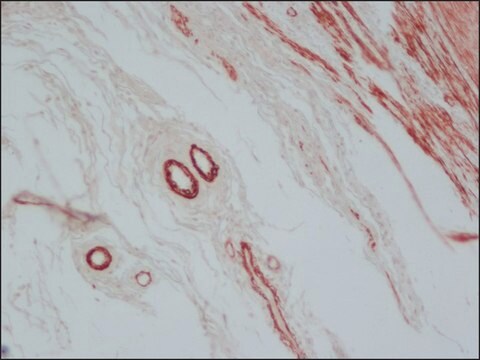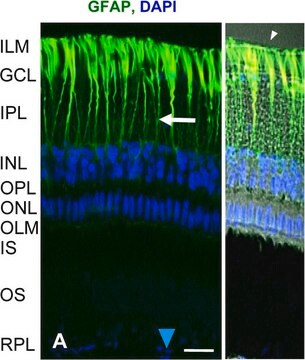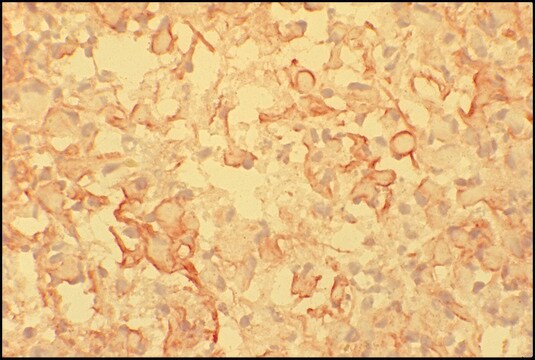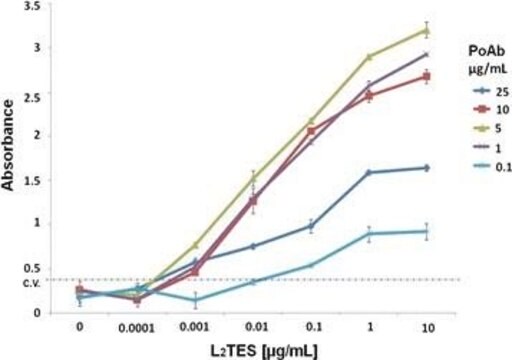SAB3701171
Anti-Mouse IgG1 (γ-chain specific)-Peroxidase antibody produced in rabbit
affinity isolated antibody, lyophilized powder
Synonym(e):
HRP
Anmeldenzur Ansicht organisationsspezifischer und vertraglich vereinbarter Preise
Alle Fotos(1)
About This Item
UNSPSC-Code:
12352203
NACRES:
NA.46
Empfohlene Produkte
Biologische Quelle
rabbit
Qualitätsniveau
Konjugat
peroxidase conjugate
Antikörperform
affinity isolated antibody
Antikörper-Produkttyp
secondary antibodies
Klon
polyclonal
Form
lyophilized powder
Speziesreaktivität
mouse
Methode(n)
immunohistochemistry: suitable
indirect ELISA: suitable
western blot: suitable
Versandbedingung
wet ice
Lagertemp.
2-8°C
Posttranslationale Modifikation Target
unmodified
Verwandte Kategorien
Allgemeine Beschreibung
Immunoglobulin G (IgG) belongs to the immunoglobulin family and is a widely expressed serum antibody. It consists of a γ heavy chain in the constant (C) region. The monomeric 150kDa structure of IgG constitutes two identical heavy chains and two identical light chains with molecular weight of 50kDa and 25kDa, respectively. The primary structure of this antibody also contains disulfide bonds involved in linking the two heavy chains, linking the heavy and light chains and resides inside the chains. Maternal IgG is the only antibody transported across the placenta to the fetus. It passively immunizes the infants. IgG is further subdivided into four classes namely, IgG1, IgG2, IgG3, and IgG4 with different heavy chains, named γ1, γ2, γ3, and γ4, respectively. IgG1 is induced due to antibody responses to membrane proteins and soluble protein antigens. It is the most abundant subclass of IgG.
Spezifität
This product was prepared from monospecific antiserum by immunoaffinity chromatography using Mouse IgG coupled to agarose beads followed by solid phase adsorption(s) to remove any unwanted reactivities. Assay by immunoelectrophoresis resulted in a single precipitin arc against Anti-Peroxidase, Anti-Rabbit Serum, Mouse IgG and Mouse Serum. Specificity was confirmed by ELISA against other Mouse or Human heavy chain isotypes. Cross reactivity with Mouse IgG2b and IgG3 is negligible (<0.5%). Cross reactivity with Mouse IgG2a and IgM is minimal.
Immunogen
Mouse IgG1 heavy chain
Anwendung
Anti-Mouse IgG1 (γ-chain specific)-Peroxidase antibody produced in rabbit has been used in immunohistochemistry and Western blotting.
Physikalische Eigenschaften
Antibody format: IgG
Physikalische Form
Supplied in 0.02 M Potassium Phosphate, 0.15 M Sodium Chloride, pH 7.2 with 10 mg/mL Bovine Serum Albumin (BSA) - Immunoglobulin and Protease free
Rekonstituierung
Reconstitute with 1.0 mL deionized water (or equivalent).
Haftungsausschluss
Unless otherwise stated in our catalog or other company documentation accompanying the product(s), our products are intended for research use only and are not to be used for any other purpose, which includes but is not limited to, unauthorized commercial uses, in vitro diagnostic uses, ex vivo or in vivo therapeutic uses or any type of consumption or application to humans or animals.
Sie haben nicht das passende Produkt gefunden?
Probieren Sie unser Produkt-Auswahlhilfe. aus.
Hier finden Sie alle aktuellen Versionen:
Besitzen Sie dieses Produkt bereits?
In der Dokumentenbibliothek finden Sie die Dokumentation zu den Produkten, die Sie kürzlich erworben haben.
Kunden haben sich ebenfalls angesehen
Epigenetic analysis of FHL1 tumor suppressor gene in human liver cancer
Jun Wang
Oncology Letters, 14(5), 6109-6116 (2017)
Dietary Protein to Carbohydrate Ratio and Caloric Restriction: Comparing Metabolic Outcomes in Mice
Samantha M.Solon-Biet
Cell Reports, 11(10), 1529-1534 (2015)
Jun Wang et al.
Oncology letters, 14(5), 6109-6116 (2017-11-09)
Liver cancer is one of the most common types of cancer among human malignancies. Four and a half LIM domains 1 (FHL1), as a tumor suppressor gene, is frequently downregulated in multiple types of human cancer. However, the role and
Dietary Protein to Carbohydrate Ratio and Caloric Restriction: Comparing Metabolic Outcomes in Mice.
Samantha M Solon-Biet et al.
Cell reports, 11(10), 1529-1534 (2015-06-02)
Both caloric restriction (CR) and low-protein, high-carbohydrate (LPHC) ad-libitum-fed diets increase lifespan and improve metabolic parameters such as insulin, glucose, and blood lipids. Severe CR, however, is unsustainable for most people; therefore, it is important to determine whether manipulating macronutrient
Barbara Wróblewska et al.
Nutrients, 12(11) (2020-11-08)
There is no effective therapy for milk allergy. The role of lactic acid bacteria (LAB) and probiotics in protection against allergy-related outcomes is still under investigation. The aim of the study was to evaluate the immunomodulative and therapeutic potential of
Unser Team von Wissenschaftlern verfügt über Erfahrung in allen Forschungsbereichen einschließlich Life Science, Materialwissenschaften, chemischer Synthese, Chromatographie, Analytik und vielen mehr..
Setzen Sie sich mit dem technischen Dienst in Verbindung.